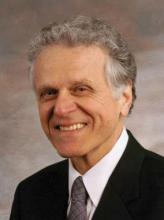BUENOS AIRES – The antimalarial drug hydroxychloroquine is now standard first-line therapy in systemic lupus erythematosus, with most SLE patients taking it indefinitely alone or in addition to other medications.
It was not always this way. The past 15 years have seen what was long regarded as a mild drug, one commonly withdrawn after evidence of disease improvement, become more often compared to a miracle drug. Hydroxychloroquine (HCQ) is now considered indispensible in lupus, and is thought to confer a host of previously unrecognized benefits, with new ones being discovered every year.
Prospective and retrospective observational studies have found HCQ use associated with the prevention of lupus flares, less damage accrual, prolonged survival, less vascular damage, fewer thrombolic and cardiovascular events, better renal outcomes, and skin and joint improvement (J. Rheumatol. 2012;39:1769-71). One team of investigators has hypothesized that HCQ decreases cancer risk in people with lupus (Ann. Rheum. Dis. 2007;66:815-17). But other researchers have challenged some of these studies as potentially biased and not in keeping with observed clinical outcomes.
At the international congress on systemic lupus erythematosus, researchers discussed the latest findings related to HCQ in lupus, and shared thoughts on their implications for clinical practice.
Dr. Murray Urowitz, a senior scientist at the Toronto Western Research Institute, referred to results from a large multicenter cohort study (n = 1,631) that showed SLE patients taking antimalarial drugs in the absence of immunosuppressant medicines had significantly lower risk of seizures (Ann. Rheum. Dis. 2012;71:1502-9), possibly because HCQ is protective against flares, and seizures are thought to be caused by active neuropsychiatric lupus.
"We’ve heard this antimalarials story over and over again," Dr. Urowitz said, in commenting on the seizure findings. "Why aren’t all of our patients on antimalarials?"
HCQ use was seen as protective against cardiovascular disease (odds ratio 0.34, 95% confidence interval 0.16-0.71; P = .003) in a cohort of 306 SLE patients in Turkey, according to findings presented at the conference by Dr. Murat Inanc of Istanbul University (Lupus 2013;22[Suppl.]:O07).
In a separate presentation, Dr. Jill Buyon, director of the Lupus Center at New York University, reported encouraging preliminary data from a small, open-label study (n = 19) of HCQ in pregnant women with anti-SSA/Ro antibodies who previously had a child with cardiac manifestations of neonatal lupus, or cardiac-NL.
The major manifestation of cardiac-NL is heart block, an abnormality in which the heart beats too slowly. It is seen in about 2% of pregnancies in mothers with anti-SSA/Ro and anti-SSB/La serology, and the risk is 17.4% for those who have previously given birth to a child with cardiac-NL. Thus far, third degree heart block has been seen in only 1 of 17 pregnancies in women with a previous child with cardiac-NL taking 400 mg hydroxychloroquine daily, Dr. Buyon reported, suggesting a protective effect.
Dr. Bevra Hahn, chief of rheumatology at UCLA David Geffen School of Medicine, Los Angeles, discussed her own approach to HCQ in the clinic. When faced with patients whose serology or symptoms are suggestive of lupus yet insufficient to fulfill criteria for a lupus diagnosis, Dr. Hahn said she initiates treatment with HCQ. "Can we prevent, delay, or make disease milder with [HCQ]? My answer to that is yes, and we do it a lot," Dr. Hahn said, citing a retrospective study that showed lupus onset to be delayed in people treated with HCQ (Lupus 2007;16:401-9).
Another recent case-control study (n = 481) bolstered the case for early use of HCQ. Investigators found that prompt use of HCQ after SLE diagnosis protected against cumulative damage after 3 years (J. Rheumatol. 2013 April 15 [doi:10.3899/jrheum.120572]).
Dr. Guillermo Ruiz-Irastorza of the University of the Basque Country, Barakaldo, Spain, gave an update at the congress on current approaches to antimalarials. "I am absolutely convinced that HCQ has a very wide range of good effects in lupus, and that the longer it is used, the better it works," he said in a later interview. "Our patients are now almost 100% on HCQ, and the outcome of most of them is amazing – obviously not only because of HCQ, but I am sure it plays a main role. We have seen very severe flares in patients stopping HCQ monotherapy. HCQ is also a crucial part of therapy in renal disease – along with lower prednisone doses, pulse methylprednisolone, and low-dose cyclophosphamide. That is our protocol, with excellent results."
A better understanding of the way HCQ works in lupus has only increased the perception of its clinical importance. In recent years, HCQ was found to have activity against antiphospholipid antibodies (Lupus 2010;19:460-9), which helps to explain its protective effect against pregnancy loss and thrombosis in SLE. More recently, HCQ has been found to antagonize toll-like receptors (TLR) 7 and 9, which are components of innate immunity erroneously activated in lupus. They are a target for new drug development in SLE (Curr. Allergy Asthma Rep. 2012;12:1-7).


